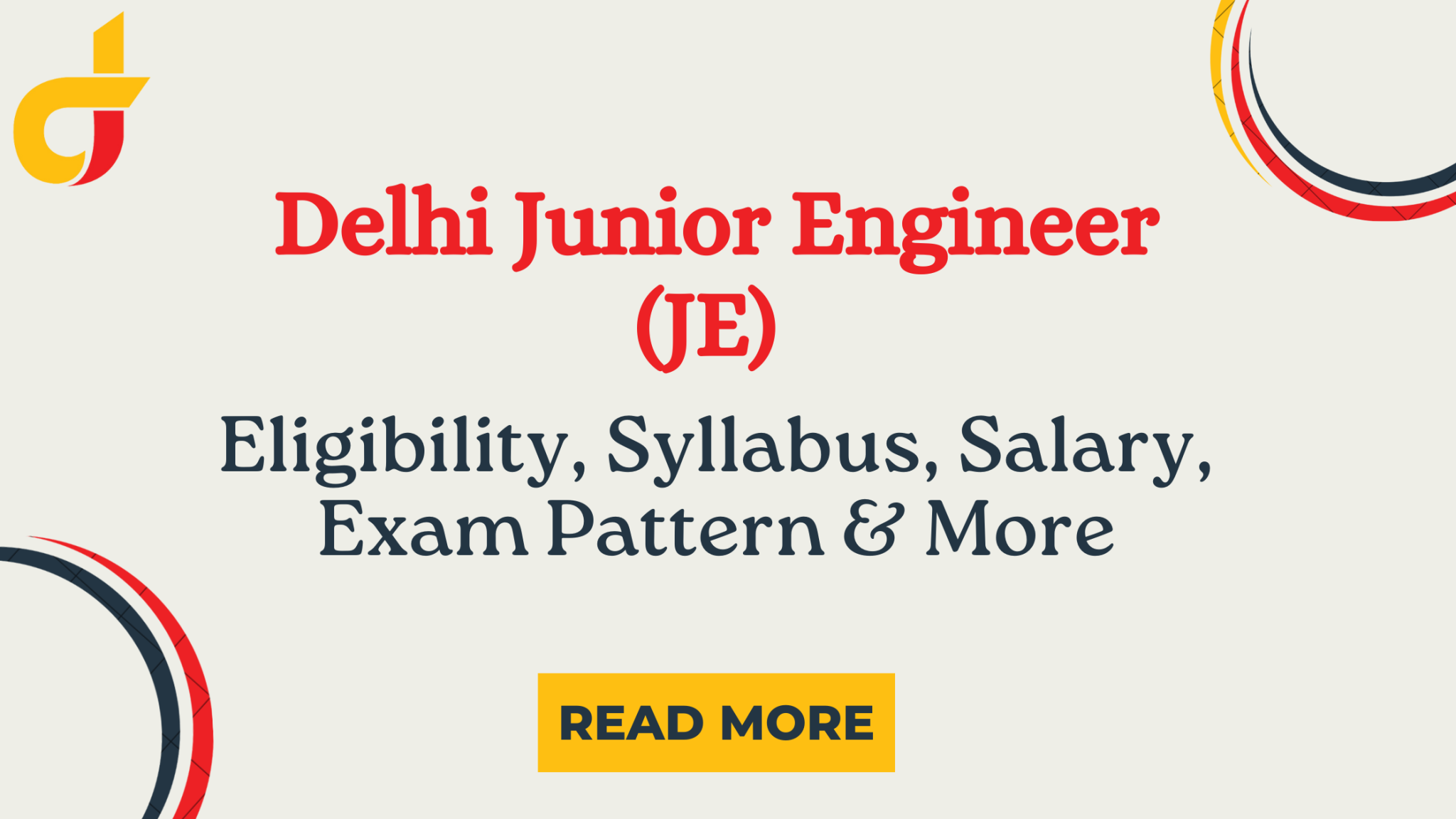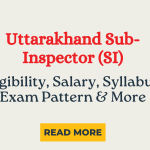The Delhi Junior Engineer (JE) recruitment exam, conducted by various agencies such as the Delhi Subordinate Services Selection Board (DSSSB), is a popular exam for engineering graduates and diploma holders seeking a government job in Delhi. This recruitment provides a golden opportunity for candidates to secure a stable job with a competitive salary in the public sector.
In this blog, we will cover the essential details about the Delhi JE exam, including eligibility criteria, the job profile, salary, the exam pattern, the syllabus, and the application process.
Overview of Delhi JE Recruitment
| Particulars | Details |
|---|---|
| Conducting Body | DSSSB (Delhi Subordinate Services Selection Board) |
| Post Name | Junior Engineer (Civil, Electrical, Mechanical) |
| Job Location | Delhi |
| Application Mode | Online |
| Selection Process | Written Exam (Tier I), Skill Test (if applicable), Document Verification |
| Eligibility | Diploma or Degree in Engineering (Civil, Electrical, Mechanical) |
| Official Website | dsssb.delhi.gov.in |
Job Profile of Delhi Junior Engineer (JE)
A Junior Engineer (JE) in Delhi is primarily responsible for overseeing engineering projects and ensuring smooth execution. They work under senior engineers and handle tasks related to planning, designing, construction, and maintenance of public infrastructure.
Some of the key responsibilities of a Junior Engineer include:
- Supervising construction work at project sites.
- Preparing technical reports and project documentation.
- Ensuring safety regulations and standards are met.
- Assisting in the planning and design of public infrastructure like roads, bridges, water supply, etc.
- Conducting inspections and maintaining records.
Eligibility Criteria for Delhi JE
To apply for the Delhi JE post, candidates must meet the following eligibility criteria:
1. Educational Qualification:
- Junior Engineer (Civil):
- A Diploma or Degree in Civil Engineering from a recognized institute/university.
- Junior Engineer (Electrical/Mechanical):
- A Diploma or Degree in Electrical or Mechanical Engineering from a recognized institute/university.
2. Age Limit:
- Minimum Age: 18 years
- Maximum Age: 27-30 years (varies by post and department)
- Age Relaxation:
- OBC: 3 years
- SC/ST: 5 years
- PwD: 10 years
Salary Structure for Delhi JE
The salary structure for Junior Engineers in Delhi is governed by the 7th Pay Commission, which includes attractive pay scales and several allowances.
| Post | Pay Scale | Grade Pay |
|---|---|---|
| Junior Engineer | ₹35,400 – ₹1,12,400 per month | ₹4,200 |
Other Allowances:
- Dearness Allowance (DA)
- House Rent Allowance (HRA)
- Medical Allowance
- Transport Allowance
Delhi JE Exam Pattern
The Delhi JE selection process is conducted in two phases: a Written Examination (Tier I) and Document Verification. Depending on the recruiting agency, some positions may also have a Skill Test or Interview.
Written Exam (Tier I) Pattern:
| Subject | No. of Questions | Marks | Duration |
|---|---|---|---|
| General Awareness | 40 | 40 | 2 hours |
| General Intelligence & Reasoning | 40 | 40 | |
| Numerical Ability | 40 | 40 | |
| Engineering Discipline (Subject-Specific) | 80 | 80 | |
| Total | 200 | 200 | 2 hours |
- Negative Marking: Yes, 0.25 marks are deducted for every wrong answer.
- Question Type: Multiple Choice Questions (MCQs).
Delhi JE Syllabus
The syllabus for the Delhi JE exam is divided into General Subjects and Subject-Specific Knowledge. Here’s a breakdown of the important topics:
1. General Awareness:
- Current Affairs (National and International)
- Indian Polity and Constitution
- Geography and Economy of India
- Environmental Studies
- General Science
2. General Intelligence & Reasoning:
- Verbal and Non-Verbal Reasoning
- Coding-Decoding
- Analogies, Series, Puzzles
- Problem-solving, logical deductions
3. Numerical Ability:
- Basic Arithmetic (Percentages, Profit & Loss)
- Ratio & Proportion, Time & Distance
- Simple & Compound Interest
- Data Interpretation
4. Subject-Specific Knowledge:
The technical section will depend on the specific engineering discipline (Civil, Electrical, or Mechanical). The major areas include:
- Civil Engineering: Building materials, construction management, structural analysis, soil mechanics, etc.
- Electrical Engineering: Electrical circuits, control systems, machines, power systems, etc.
- Mechanical Engineering: Thermodynamics, fluid mechanics, production engineering, machine design, etc.
Application Fee for Delhi JE
| Category | Application Fee |
|---|---|
| General/OBC | ₹100 |
| SC/ST/PwD | Nil |
| Female | Nil |
How to Apply for Delhi JE Recruitment?
Follow these steps to apply for the Delhi JE recruitment:
- Visit the Official Website: Go to dsssb.delhi.gov.in.
- Registration: Complete the registration by providing basic details like your name, email, and mobile number.
- Fill Application Form: Enter educational qualifications, personal information, and engineering discipline.
- Upload Documents: Upload scanned copies of your photograph, signature, and required certificates.
- Pay Application Fee: Pay the application fee using net banking, credit card, or debit card.
- Submit Application: Review the form, ensure accuracy, and submit.
Selection Process for Delhi JE
The selection process for the Delhi JE post includes the following stages:
- Written Examination (Tier I):
- Candidates need to qualify the written exam to proceed to the next stage.
- Document Verification:
- Shortlisted candidates will be called for document verification, where they will need to submit proof of age, educational qualifications, and caste certificate (if applicable).
Preparation Tips for the Delhi JE Exam
- Understand the Exam Pattern: Familiarize yourself with the exam structure and types of questions asked.
- Time Management: Practice mock tests to improve your speed and accuracy.
- Focus on Weak Areas: Pay extra attention to subjects where you may need improvement.
- Stay Updated: Keep yourself updated with current events and general awareness topics.
Checkout Delhi Courses on Dhurina by Top Educators
Conclusion
The Delhi JE recruitment is a fantastic opportunity for aspiring engineers to work in a secure and prestigious role in the public sector. With a competitive salary structure, benefits, and career growth opportunities, this is an attractive option for engineering graduates and diploma holders.
By understanding the eligibility criteria, exam pattern, syllabus, and selection process, candidates can better prepare themselves to succeed in this competitive exam.










